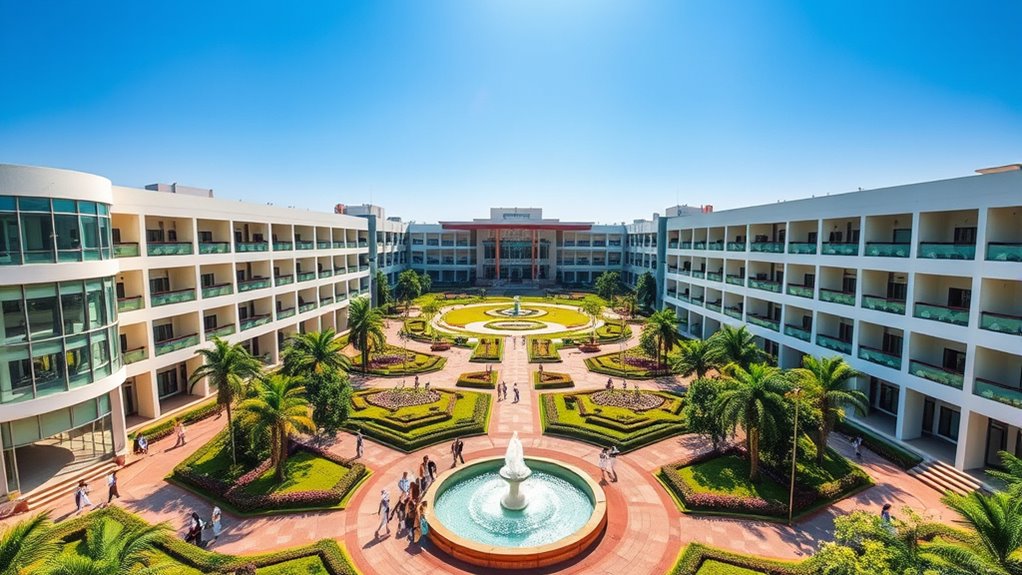
If you’re considering a career in medicine, private medical colleges in Madhya Pradesh might catch your interest. These institutions offer a blend of theoretical and practical education, essential for aspiring doctors. However, the journey isn’t without its hurdles. From admission requirements to classroom dynamics, there’s more to this landscape than meets the eye. What challenges do these colleges face, and how do they impact the healthcare system in the region?
Key Takeaways
- Madhya Pradesh hosts a growing number of private medical colleges, attracting many aspiring medical students with competitive tuition fees.
- Admission requires completion of higher secondary education, relevant entrance exams like NEET, and specific application documents.
- The curriculum includes foundational subjects, clinical training, and hands-on experiences through practicals and internships.
- Private colleges face challenges such as financial sustainability issues, overcrowded classrooms, and quality assurance concerns affecting education standards.
- The presence of private medical colleges has increased healthcare professionals and improved access to healthcare in Madhya Pradesh.
Overview of Private Medical Colleges in Madhya Pradesh
When considering the landscape of medical education in India, you’ll find that Madhya Pradesh is home to a growing number of private medical colleges. These institutions are becoming increasingly popular among aspiring medical students due to their unique offerings and competitive tuition fees. Many of these colleges boast experienced faculty members with impressive qualifications, ensuring that you receive quality education and training. As you explore your options, you’ll notice that some colleges emphasize hands-on learning and research opportunities, helping you build a solid foundation in medicine. However, it is crucial to weigh the costs against the quality of education provided. By doing thorough research, you can make an informed decision that aligns with your career aspirations and financial situation.
Admission Process and Eligibility Criteria
Choosing to pursue a medical degree in Madhya Pradesh involves understanding the admission process and eligibility criteria for private medical colleges. First, you’ll need to complete your higher secondary education with a focus on science subjects, particularly Biology, Chemistry, and Physics. Next, you’ll have to appear for the relevant entrance exams, such as NEET, which is vital for securing a seat. Each college has its own application deadlines, so it’s important to stay updated and submit your application on time. Make sure to prepare all necessary documents, including your mark sheets and identification proof. After the entrance exams, the colleges will announce their merit lists, and you’ll need to follow up with the admission procedures for your chosen institution.
Curriculum and Facilities Offered
As you begin your medical education journey, you’ll find that the curriculum at private medical colleges in Madhya Pradesh is designed to provide an extensive understanding of both theoretical and practical aspects of medicine. The curriculum structure typically includes foundational subjects, clinical training, and elective courses, ensuring a well-rounded education. You’ll engage in hands-on experiences through practical sessions and internships, which are essential for your development as a healthcare professional.
When it comes to facilities, you’ll notice a significant facility comparison among colleges. Many institutions boast state-of-the-art laboratories, advanced simulation centers, and well-equipped libraries, enhancing your learning environment. Access to modern technology and resources can greatly impact your educational experience, preparing you for a successful career in medicine.
Challenges Faced by Private Medical Colleges
Despite the many advantages of studying at private medical colleges in Madhya Pradesh, these institutions face several significant challenges that can impact your educational journey. One major issue is financial sustainability; many colleges struggle to maintain adequate funding, which affects their ability to provide resources, infrastructure, and faculty. This can lead to overcrowded classrooms and inadequate facilities. Additionally, ensuring quality assurance is vital but often overlooked. The lack of standardized assessments and consistent curriculum delivery can compromise the education you receive. Without strong measures in place to uphold academic standards, your learning experience may suffer. Addressing these challenges is essential for private medical colleges to enhance their reputation and meet the needs of aspiring medical professionals like you.
Impact on the Healthcare System in Madhya Pradesh
The presence of private medical colleges in Madhya Pradesh greatly influences the local healthcare system, primarily by increasing the number of qualified healthcare professionals. With more graduates entering the workforce, you’ll find improved healthcare access for communities that previously struggled with shortages. These colleges emphasize quality education, ensuring that students receive training that meets modern healthcare standards. As a result, healthcare services become more efficient, and patients enjoy better outcomes. Furthermore, the competition between private and public institutions can drive innovations and improvements in service delivery. Ultimately, the growth of private medical colleges not only enhances the skill level of practitioners but also contributes positively to the overall healthcare landscape in Madhya Pradesh.




